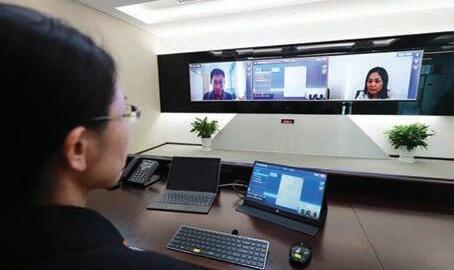
6 minute read
China’s internet courts revolutionising online dispute resolution mechanism
from Epaper_23-05-2 KHI
ISLAMABAD MIAN ABRAR
Dispute resolution through arbitration, mediation and cost-effective and timely measures has been a cherished dream for the communities globally.
Advertisement
In the new age, the need for confidential and quick resolution of disputes based on justice and equality between commercial entities through cost-effective measures is a major challenge.
Confucius says that justice is the “real essence” of a progressive society and sustainable social development. Whereas, the real philosophy of socialism also speaks highly about justice and the Chinese model of Internet Court is the replica of it.
In this backdrop, China’s online internet courts are doing wonders and thousands of litigants are being provided immediate, transparent and cost-effective justice without spending money. In the age of Covid-19 pandemic, Chinese authorities focused on online dispute resolution through internet courts. Initially, these courts were established in Beijing, Guangzhou and Hangzhou. The internet courts do not require citizens to appear in court as the ‘smart court’ allows participants to register their cases online and resolve their matters via a digital court hearing.
The Chinese internet courts handle a variety of disputes, which include intellectual property, e-commerce, financial disputes related to online conduct, loans acquired or performed online, patent registration, domain name issues, intellectual property and civil rights cases involving the Internet, product liability arising from online purchases and certain administrative disputes.
Internet Courts of China has legal and administrative protection in term of carrying the cases, giving verdicts and enforcement of decisions and laws of the land empower these courts to take all possible appropriate measures to protect the sanctity of the law which clearly upholds that Chinese are lawloving people and always respect others different views.
Since China has the biggest internet community in the world which needs proper and accurate regulatory mechanisms to avoid any unwanted bugs in the system of delivery of services, banking & financial transactions, credit & debit cards, dysfunctional of ATMs cards etc. and last but not least one line shopping. It is indeed anti-fraud, infringement, cheat, disinformation, and any corporate discrimination against one individual or society at large in the country which is praiseworthy.
The Beijing Internet Court deals in 11 different types of cases. It was established during September 2018. Till now more than 400,000 cases have been received and more than 85 percent have now been resolved which has the highest percentage of judicial efficiency in the world. There are specialized judges working 24/7 to resolve the disputes between two parties. On average every judge has 1000 cases which are indeed commendable. It usually takes 86 days to reach its conclusion. With special reference to maintain complete elements of impartiality and accuracy, all the decisions are being judged through different innovative means, making the Internet Court an apex status in the judicial system of China.
An official of Beijing Internet Court told this scribe that impartiality and justice are core characteristics of the online litigation process.
“Beijing Internet court is for protection of human rights under its zero-distance policy. We provide live streaming of court hearings which is a revolutionary online justice system. This is a blockchain evidence platform which is using 5G and big data technology. The parties have the right to appeal in financial court or intermediary court and 99.99 percent cases are heard online while 0.01 percent cases are offline hearings of cases,” the official said.
“The average time of the whole process is 86 days while most of the cases are of civil nature. But if the matter gets criminal in nature, it is referred to other courts and once decided, the civil case hearing may resume again in the internet court,” the official asserted.
The official said that mostly people turn to the internet court on weekends and the court follows the principle of establishing rules through judges.
“Interestingly, even foreign companies also have the right to approach the Chinese Internet Court to seek justice. Amazon, Apple and many other multinational companies have filed online petitions in this regard which clearly shows their utmost confidence in the judicial system of China,” the official added.
Moreover, he added, it has revolutionized the concept of Legal Artificial Intelligence management system in the country which is providing the cheapest source of justice in the country by removing all barriers of physical, physiological, philosophical and geographical barriers of the plaintiff which is indeed commendable.
“Beijing, Hangzhou and Hangzhou courts have regional cases to deal with. All the three courts are revolutionary in nature. During the pandemic, all courts provided online services. During the pandemic, the ratio of online cases rose to 44 percent which brought about a revolution in China’s litigation history,” the official said. With the formation and activation of the Internet Courts mechanism the entire process from filing to adjudication is one line which brings great convenience to both defendant and plaintiff.
Audio leak of Indian journalists exposes facts behind Kashmiri’s killing in IIOJK
SRINAGAR STAFF REPORT

A leaked audio call between Munish Sharma, an Indian journalist, asking one of his subordinates to distort facts about the killing of Mukhtiar Hussain Shah who died in police custody on April 27, has exposed Indian brutalities and human rights violations in Indian Illegally occupied Jammu and Kashmir (IIOJK).
In the audio leak, Shrama could be heard directing Balkar Singh from Amar Ujala Newspaper, Samba, about filing of a news story to cover up the incident.
Mukhtiar Hussain Shah, was arrested on April 21 for interrogation by the Indian police on suspicion of his links with Poonch attack in which several Indian soldiers were killed, was briefly released and then summoned up for interrogation on April 26, but he died in mysterious circumstances . Locals of Mendhar area blocked the road in protest over his death.
India-based web portal The Wire said wrote that exposing the plan to cover up the killing of Mukhtiar
Hussain was a big success of Pakistani intelligence agency. The portal admitted that Pakistani intelligence agencies have the full capability to foil the designs of the enemy on its own soil.
According to the Wire, an Indian news outlet, the family of a 48-year-old man, who died after being named as a suspect in the Poonch attack case, has dubbed the magisterial probe ordered by the puppet IIOJK administration as an “official cover-up”.
Seeking a judicial probe into the death of Mukhtiar Hussain Shah, his family alleged that the order of the magisterial inquiry was “full of discrepancies”. “The order reads like an attempt to cover up the truth. It is a farce. We reject it and demand a judicial probe,” said Rafaqat Hussain Shah, Mukhtiar’s brother.
“Rafaqat claimed that there were “bruises” and “black marks” on Mukhtiar’s back and thighs, suggesting that he was tortured in custody. “If he has committed any wrong, let the investigators reveal the facts publicly. Why are they trying to hide the truth?” he was quoted by the Wire. Senior superintendent of police, Poonch, Rohit Baskotra, hung up the call when the Wire asked for his comments on the case, similarly, deputy commissioner Poonch, Inder Jeet, when contacted, said the matter was not within his jurisdiction now as he had been transferred out of the district.
Australian MP demands withdrawal of Indian troops from IIOJK, restoration of Article 370
AMSTERDAM STAFF REPORT
Dr Amy McMillan, Green Party, member of Queensland Parliament, Australia, has raised the blatant rights violations by the Modi regime in Indian illegally occupied Jammu and Kashmir in the local parliament.
Dr Amy addressing the parliamentarians said that she joined the human rights defenders and UN Special Rapporteur in condemning “the violence as well as oppression that has unfolded in Kashmir [IIOJK] for over many decades”.
“It has been four years since the revocation of Kashmir’s special status of Kashmir, one of the wider attacks on the sovereignty of the Kashmiris in the modern times. The revocation has led to a new wave of oppression and violence, restrictions on freedom of expression, preferably on internet and detention of journalists”.
In her speech, she referred to the UN Special Rapporteur on Minority and said that the loss of autonomy and imposition of direct rule by New Delhi suggests that the people of Indian illegally occupied Jammu and Kashmir have no longer their own government and have lost the power to legislate or mend laws in a way to ensure protection of their rights.
Dr Amy McMillan went on to add that measures like forced demographic changes are stripping the people of Kashmir of their land and resources. She said sexual violence against Kashmiri women has been among the highest in the conflict zones. She deplored that the detention of Kashmiri journalists have been legalized under so-called Public Safety Act. She demanded the immediate withdrawal of around one million Indian occupation troops from Jammu and Kashmir, restoration of Article 370 and release of detained Kashmiri journalists, including Fahd Shah, all other journalists and human rights defenders. The MP also demanded international probe into sexual violence against Kashmiri women.




